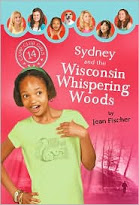This week, we begin with a think-about-it question:
When you sit down to write a story,
do you always have a clearly formed main idea?
do you always have a clearly formed main idea?
We writers are a driven and enthusiastic bunch who likes to plunge right into our writing. I'm guilty of it, and most likely you are too. When we get an idea, we don't consciously ponder that a really good story has a soul -- a story within a story hidden deep inside the cache of words. We don't stop to think that the soul is the essence, the seed from which a story grows, and most importantly, that it is the place that evokes feeling among readers. Instead, we just sit down and write.
Remember when you were a kid in school and the teacher asked you to find a writing selection's main idea? He or she probably taught you to state it in a single sentence. The American playwright David Belasco encouraged this, too. He said, "If you can't write your idea on the back of my calling card, you don't have a clear idea." (Calling cards in Belasco's day were quite small, often smaller than a business card.) The poet Robert Southey understood the concept of brevity/soul/feelings, too. He said, "It is with words as with sunbeams. The more they are condensed, the deeper they burn."

Last week, I was listening to author Jerry Apps as he was interviewed on Wisconsin Public Radio. He spoke about a writing exercise he uses with his students. You might be familiar with it. It is the six-word story, a popular writing prompt often introduced using a six-word story written by Ernest Hemingway:
For sale: baby shoes, never worn.
How do those six words make you feel? Hemingway is said to have called it his best work. I don't know if he ever turned it into a full-length story, but the essence is there. He created the story within the story, the part that stirs up feelings.
Jerry told about an intriguing assignment that he gave to his writing class. He asked them to write personal narratives, stories from their lives, using just six words. It sounds easy, but it's not. The six words have to be well chosen. They have to tell a good true story, one that touches readers' hearts and makes them want to know more. If you would like to read some of the responses to Jerry's assignment, you can find them on his blog.
Here are a few more examples:
Someone else lived out my dreams.
I'm the fool who rushed in.
My lover arrived in a box.
That last one really makes you wonder!
So, can you do it? Can you write a six-word personal narrative? Give it a try. Who knows, maybe you'll come up with a great story idea. But remember, you're not writing a haiku poem which usually relies on counted syllables. In this exercise, you count only words. If you want an even more challenging exercise, choose your favorite novel and try to write its main idea as a six-word story.
Good luck, and have fun!

Listen to a webcast of Jerry Apps' interview with Wisconsin Public radio by going here. Then search for Tuesday 10/6/2009 11:00 AM.













6 comments:
Excellent post! I'm going to have to think about your challenge. A 6 word personal narrative is definitely hard. To a writer, words are comforting, but sometimes it's what you don't write that is the most meaningful to the reader.
Caroline Pointer
Family Stories
Caroline,
Thanks for directing others to this post from Twitter.
You're right, this is a hard challenge, especially since each word needs to be carefully chosen to reach another soul. And that's what we writers do, we connect souls. It's a little bit like genealogy, isn't it?
Jean
'After the wedding their romance ended'. There, my six word narrative for the flash fiction I'm working on. Personal to me and my characters. I like your blog and will visit again.
Simone
Hi, Simone.
I like the six words you chose. Thanks for visiting my blog.
Jean
His last lesson was "It Could." ~
6-word narrative of a very personal and meaningful blog post of mine this week.
I love it~ genealogy and writing, connecting souls.
Caroline
Family Stories
I want to know more, Caroline :) I'm heading over to your blog.
Post a Comment